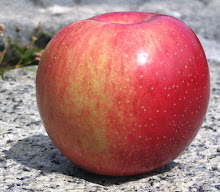"Is that a really tiny apple or a really big cherry?"—my daughter's reaction to Wickson, which is either a small apple or a large crab.

|
With its bright saturated red blush (over a yellow not unlike that of a Rainier cherry), round, slightly elongated shape, and long stem, this small apple bears more than a passing resemblance to that fruit. Its skin is glossy and the small fruit is firm.
Wickson has coarse light-yellow flesh that is juicy and wonderfully crisp. It
is well-balanced, tartness predominating but tempered by sugar, and with
distinct malt-sugar notes.
This is not a flavor I have encountered in any other apple and I wonder what
kind of cider these would produce.
In any case they make an excellent snack, full of snap and spice—but each is just a few bites. I found myself gnawing every eatable scrap of these little gems.
 Trees of Antiquity
says
that Wickson was named for a famous California pomologist, and that it is
indeed a "perfect cider apple."
Trees of Antiquity
says
that Wickson was named for a famous California pomologist, and that it is
indeed a "perfect cider apple."
Vintage Virginia Apples, among other sources, says that Wickson is bred from Newtown Pippin and Esopus Spitzenberg, two wonderful antique varieties. This was an inspired cross. (Update: But see this comment below).

Wickson is one of our more reliable apples; they ripen late enough to miss the mid-fall heat and always set a good crop. People are expecting them to be tart like a crab, but instead like you knibble them down to the core as the flesh is crisp and very flavorful.
ReplyDeleteYou are correct in suspecting they would make great cider, as they were bred by Albert Etter just for that purpose.
I have a Wickson tree and love it. Just one thing; don't leave it on the tree too long or it gets mushy.
ReplyDeleteAt least a few sources think that while Etter wrote down Spitzenberg x Newtown as the parent of Wickson Crab, he wasn't referring to the famous cultivars Esopus Spitzenberg and Newtown Pippin, but of his own crab cultivars, Spitzenberg Crab and Newtown Crab.
ReplyDeletehttp://www.orangepippintrees.com/crab-apple-trees/wickson-crab
http://www.greenmantlenursery.com/fruit/etter-apples.htm
I tried searching the USPTO database but I couldn't find the original patent to verify.
You see, this is why I blog. How else would I ever learn about stuff like this?
DeleteMany thanks, Jinzo.
https://patentimages.storage.googleapis.com/08/90/a5/430d512ba78632/USPP724.pdf
DeleteEureka! @David, you win the apple internet this week! The patent, clearly refers to "the Newtown and Spitzenberg crab."
DeleteThank you.
I thought you would enjoy reading some of the research and comments about this apple variety from the NYS AgEx station. http://www.ars-grin.gov/cgi-bin/npgs/acc/display.pl?1012832
ReplyDeleteHa! Astringent, acid, worthless. I can't wait until my grows big enough to set fruit!
DeleteInteresting to see how different the apple from the GRIN site looks (color, shape, size, lenticels, stalk lenght... everything). Maybe different varieties? Mislabeled?
DeleteJessica, it is rather convoluted, but if you read all the comments in my Crimson Crisp review I think it is hard to avoid the impression that Geneva and GRIN have confused and misclassified at least two of the Etter apples.
DeleteThere is certainly a great dal of experience (and not just my own) to suggest they got Wickson wrong.
Excellent haunting flavor. My tree produced for the first time last year. But agreed that they do seem to soften perhaps sooner than some other and here in VA the *&^% stinkbugs seem to love them. Thanks for taking the time write the apple reviews, I enjoy reading them and comparing to others and my opinions.
ReplyDeleteI find they are not bad keepers if refrigerated.
DeleteYour stinkbugs have excellent taste.
This is my all time favorite apple. The first time I took a bite, it just completely blew my mind. SO tart, SO spicy, SO aromatic, SO sweet. It's like the flavor of 5 regular amazing apples packed into one tiny package. Another one which I've only ever from a friend who picked it at Poverty Lane in NH. He says many years they don't have any. And that its small size makes it kind of a pain to pick any quantity of them.
ReplyDeleteBTW - awesome blog, thanks for putting this together!
Thanks for stopping by, Holly!
DeleteI got a bag of Wickson this season, after an amazingly hot summer. They had 21 Brix and far more flavor to accompany the acid than I'd been expecting. They seem to shine Out West. Gotta get this growing in the area for cider!
DeleteThe Cidery Wandering Aengus made a single varietal cider out of Wickson Crabs, very good!
ReplyDeleteThank you for that! Here's the link.
DeleteI special-ordered their Wickson cider a few years ago, as it could not be found in local stores, and I was a bit disappointed. I liked their "Bloom" and "Dry Oaked" better.
DeleteAnyone know where I can get some wickson crab scion wood or trees in BC Canada?
ReplyDelete@David, you could always try going to the source.
DeleteMark Kurzmack, below, has another good suggestion that may not have pinged you.
Try Salt Spring Apple company. Wickson is listed as one of the varieties they grow.
ReplyDeletehttp://www.saltspringapplecompany.com/Apple-Varieties-T-Z.htm
From what I have read, this cultivar is susceptible both to fireblight and scab. Would this be the case?
ReplyDeleteAren't most varieties vulnerable to these diseases? Some have some resistance of course.
DeleteFrom what I remember there are still cultivars that are resistant to both diseases
ReplyDeleteI do believe that Reine de Reinettes (King of the Pippins) is partially resistant to both Fire blight and Scab.
https://www.rhs.org.uk/disease/apple-and-pear-scab
https://blogs.cornell.edu/khanlab/extension/fire-blight-susceptibility-of-common-apple-cultivars/